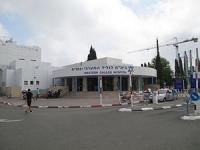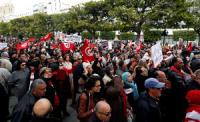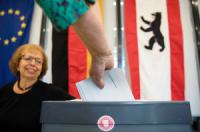-
Cyber Security R&D Showcase coming in July
The 2017 Cyber Security R&D Showcase and Technical Workshop is scheduled for 11-13 July at Washington, D.C.’s Mayflower Hotel. In all, fifteen research areas will be featured: mobile security, cyber-physical system security, software assurance, data privacy, identity management, distributed denial of service defense, next generation cyber infrastructure, technology transition, cyber risk economics, cybersecurity research infrastructure, modeling of internet attacks, support for law enforcement, moving-target defense, cloud security and insider threats. During the conference, attendees can choose from more than 115 technical presentations representing a combined $250 million of federally funded R&D.
-
-
U.S., rejecting Turkish opposition, to arm Kurdish militia ahead of Raqqa battle
The Trump administration has decided to arm Syria’s Kurdish fighters because it was “necessary” for recapturing the ISIS stronghold of Raqqa. The decision was made in the face of fierce opposition from Turkey, a NATO ally which regards the Syrian Kurds as terrorists. Turkey has been worried that a better-armed Kurdish militia — known as the Kurdish Peoples’ Protection Units (YPG) – would be in a stronger position to aid the PKK, a Turkish Kurdish group agitating for greater Kurdish autonomy in eastern Turkey. The YPG leads the Syrian Democratic Forces, or SDF, a multi-ethnic armed militia. Turkey was willing to agree to the arming of the non-Kurdish elements of the SDF, but the Pentagon concluded that without the YPG, the SDF would not be an effective fighting force.
-
-
Israeli hospital takes lead in treating Syria’s wounded

The Western Galilee Hospital, which is located in Nahariya on Israel’s northern Mediterranean coast, is situated just a few kilometers away from the Lebanese border, and has become a sanctuary for victims of Syria’s brutal civil war.According to Israeli officials, the country has so far quietly taken in more than 3,000 Syrians.The medical care provided is free of charge and hospitals do not discriminate on grounds of politics and religion when it comes to admittance.Aside from the humanitarian aspect to saving those wounded in the war, cooperation with rebel groups near Israel’s border also affords Israel a measure of protection.
-
-
ACLU issues Texas “travel advisory”

The American Civil Liberties Union (ACLU) issued a “travel alert” informing anyone planning to travel to Texas in the near future to anticipate the possible violation of their constitutional rights when stopped by law enforcement. The ACLU says that the alert comes amid the passing of a Texas law known as SB4. The law gives a green light to police officers in the state to investigate a person’s immigration status during a routine traffic stop, leading to widespread racial profiling, baseless scrutiny, and illegal arrests of citizens and non-citizens alike presumed to be “foreign” based on how they look or sound.
-
-
Lawsuit over sanctuary cities bill is just a matter of time, opponents say
The question isn’t whether or not the Texas attorney general’s office will be hauled to court over a Texas Senate bill to ban “sanctuary” policies in Texas — but, more likely, when they’ll be asked to defend Senate Bill 4 (SB4) in a federal court. The legislation makes sheriffs, constables, police chiefs and other local leaders subject to a Class A misdemeanor and possible jail time if they don’t cooperate with federal authorities and honor requests from immigration agents to hold inmates who are subject to deportation. It includes civil penalties for entities that violate the provision that begin at $1,000 for a first offense and climb to as high as $25,500 for subsequent infractions. It also applies to public colleges.
-
-
The security problems now facing Emmanuel Macron, France’s new president
Emmanuel Macron emerged from one of the most brutal and eventful election campaigns in recent European history as France’s next president. Macron has promised to increase security spending, strengthen internal security services and introduce new centers to integrate people returning from fighting for so-called Islamic State. But solving the riddle of France’s recent security woes is going to require wide-ranging action and reform. This will present the new president with one of the biggest challenges of his presidency. Macron will need to tackle the chronic, daily, security issues France faces and overcome the institutional atrophy and social marginalization which are such powerful drivers of insecurity. There is a reason, however, that previous administrations have not tackled these issues: they are politically explosive and economically costly. In a presidency that is already looking crowded with political challenges and policy promises, where building a broad base of support without a party after the parliamentary elections in June looks difficult at best, there is a risk that these issues will be once again pushed to the back of the queue.
-
-
U.S. kills ISIS top commander in Afghanistan
Abdul Hasib, ISIS’s leader in Afghanistan, was killed by U.S. Special Forces in the eastern province of Nangarhar. American and Afghan officials said that the operation, in which Afghani forces also participated, was conducted last month. Hasib, who last year replaced Hafiz Saeed Khan – who had been killed in a U.S. drone strike – was behind several high-profile attacks, which included an 8 March attack on the main military hospital in Kabul.
-
-
Pentagon looks at new evidence of military cooperation between Iran and North Korea
The Pentagon says that a submarine used in the failed underwater launch of a cruise missile last week by Iran, draws attention to Iran’s military cooperation with North Korea. When Iran used a “midget” submarine for the underwater launch of a Jask–2 cruise missile this week, U.S. Defense Department officials said that it was based on the North Korean Yono design. This was seen as further evidence that the two nations are sharing military technology.
-
-
Integrating radical fighters who return home isn’t easy, but can be done

Thousands of youths have been recruited by terrorist groups from Africa, the Middle East, Europe, Asia and America. Between 2011 and 2016 the number of “foreign fighters” rose to more than 42,000 – among them 5000 Westerners and close to 7000 North Africans. They had travelled to the Middle East to join jihadist organizations such as the so-called “Islamic State” (IS) and the Syrian Fateh al-Sham Front (ex-Al-Nusra), a former al Qaeda affiliate. By early 2016, almost a third of these foreign fighters had returned to their countries of origin. Now that IS is suffering serious military setbacks, the flow of foreign fighters seems to have dwindled. More returnees can be expected to follow in the near future. How should governments manage these returnees? What the available evidence suggests is that governments must respond realistically to a complex problem. And they need to accept that opting for the reintegration of (former) terrorists to minimize the possibilities of future violence is not adopting a soft approach. Realistically, it’s the only approach.
-
-
Some visa applicants would be asked to provide five years’ worth of social media posts
The State Department is planning to ask people who apply for visas to live and work in the United States, to allow government officials to review their social media post going back five years. The State Department will also ask applicants for their email addresses and phone numbers, and for their work and travel history during the previous fifteen years. Applicants will also have to provide the names and dates of birth of immediate family members. The new measures would apply only to individuals who have been identified as requiring additional security screening – for example, people who have travelled to countries and areas where known terrorist organizations are active. The State Department estimates that the new policy would apply to about 65,000 people a year, or about 0.5 percent of visa applicants.
-
-
Lawsuits filed about electronic privacy, profiling abuses at borders, airports
Earlier this week, two lawsuits were filed in federal court to demand that the Department of Homeland Security (DHS) release information about how federal officials have treated travelers who are Muslim or who are perceived to be Muslim at United States borders, including airports. The lawsuits highlight the numerous recent reports of individuals who are or are perceived to be Muslim having their electronic devices searched while traveling or having their trusted traveler status revoked without explanation.
-
-
Efforts to prevent alternative methods of border crossing need better monitoring: GAO
As DHS has increased the security of overland smuggling routes, transnational criminal organizations have adapted their techniques to smuggle drugs and humans through alternative methods. These methods include cross-border tunnels, ultralight aircraft, panga boats, and recreational maritime vessels. GAO says that while these methods account for a small proportion of known smuggling, they can be used to transport significant quantities of drugs or for terrorist activity.
-
-
Rewriting NAFTA has serious implications beyond just trade
President Donald J. Trump has called the North American Free Trade Agreement (NAFTA) our “worst trade deal.” After flip-flopping between scrapping NAFTA altogether and saying that the agreement required only tweaks, Trump is trying to force a renegotiation of a deal that supports three million American jobs. This may seem like just another trade dispute, but NAFTA has bound together North America’s economic and security considerations. The renegotiation of NAFTA may thus have serious implications not only for trade and the continental economy, but also for immigration and border security. Bad deal or not, NAFTA has fundamentally reshaped North America’s immigration and security policies. Any changes to NAFTA will certainly have repercussions that reach far beyond the economy.
-
-
Russia’s hacking, disinformation efforts aim to influence German, French elections

Russian government hackers and disinformation specialists were successful in their hacking and disinformation campaign in the run-up to the November 2016 election in the United States. “I think one of the lessons that the Russians may have drawn from this is that this works,” FBI director James Comey told lawmakers on Tuesday. German and French intelligence services agree with Comey. They say they have detected an intensification of Russian hacking and disinformation efforts in the run-up of the second round of France’s presidential election – to be held this coming Sunday – and Germany’s federal election, to be held in September. In both Francde and Germany, Russia’s campaign aims to strengthen populist, far-right, ultra-nationalist, and anti-American politicians and parties.
-
-
The lessons on Russian intelligence
Despite President Trump’s saying that it’s all just “fake news,” James R. Clapper, who was U.S. director of national intelligence from 2010 until January, said he has no doubt that Russia successfully interfered in the 2016 election and “clearly favored” Trump over Hillary Clinton. “Clearly, the Russians — and the shots were called at the highest level — were interested first in sowing dissension and doubt and discord in this country,” Clapper said. As the campaign went on, however, he said their aims switched to helping Trump. “They, too, didn’t initially take Mr. Trump seriously, but later on they did,” Clapper said at a Harvard Kennedy School talk. Clapper said we should expect more Russian meddling in U.S. elections.
-
More headlines
The long view
Kinetic Operations Bring Authoritarian Violence to Democratic Streets
Foreign interference in democracies has a multifaceted toolkit. In addition to information manipulation, the tactical tools authoritarian actors use to undermine democracy include cyber operations, economic coercion, malign finance, and civil society subversion.
Patriots’ Day: How Far-Right Groups Hijack History and Patriotic Symbols to Advance Their Cause, According to an Expert on Extremism
Extremist groups have attempted to change the meaning of freedom and liberty embedded in Patriots’ Day — a commemoration of the battles of Lexington and Concord – to serve their far-right rhetoric, recruitment, and radicalization. Understanding how patriotic symbols can be exploited offers important insights into how historical narratives may be manipulated, potentially leading to harmful consequences in American society.
Trump Aims to Shut Down State Climate Policies
President Donald Trump has launched an all-out legal attack on states’ authority to set climate change policy. Climate-focused state leaders say his administration has no legal basis to unravel their efforts.
Vaccine Integrity Project Says New FDA Rules on COVID-19 Vaccines Show Lack of Consensus, Clarity
Sidestepping both the FDA’s own Vaccines and Related Biological Products Advisory Committee and the CDC’s Advisory Committee on Immunization Practices (ACIP), two Trump-appointed FDA leaders penned an opinion piece in the New England Journal of Medicine to announce new, more restrictive, COVID-19 vaccine recommendations. Critics say that not seeking broad input into the new policy, which would help FDA to understand its implications, feasibility, and the potential for unintended consequences, amounts to policy by proclamation.
Twenty-One Things That Are True in Los Angeles
To understand the dangers inherent in deploying the California National Guard – over the strenuous objections of the California governor – and active-duty Marines to deal with anti-ICE protesters, we should remind ourselves of a few elementary truths, writes Benjamin Wittes. Among these truths: “Not all lawful exercises of authority are wise, prudent, or smart”; “Not all crimes require a federal response”; “Avoiding tragic and unnecessary confrontations is generally desirable”; and “It is thus unwise, imprudent, and stupid to take actions for performative reasons that one might reasonably anticipate would increase the risks of such confrontations.”
Luigi Mangione and the Making of a ‘Terrorist’
Discretion is crucial to the American tradition of criminal law, Jacob Ware and Ania Zolyniak write, noting that “lawmakers enact broader statutes to empower prosecutors to pursue justice while entrusting that they will stay within the confines of their authority and screen out the inevitable “absurd” cases that may arise.” Discretion is also vital to maintaining the legitimacy of the legal system. In the prosecution’s case against Luigi Mangione, they charge, “That discretion was abused.”
